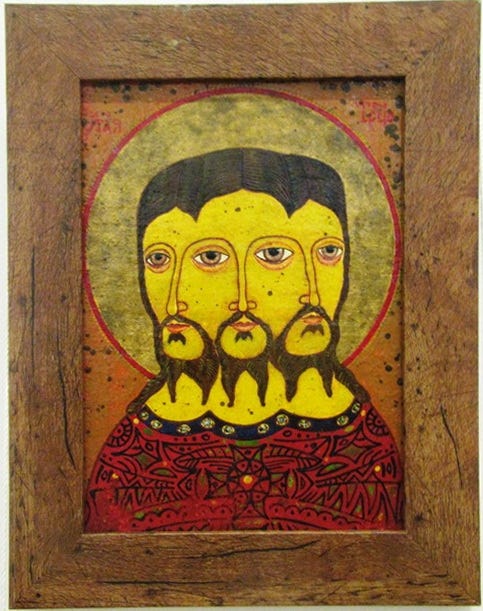This Sunday the church culminated the three part drama of Lent-Easter-Pentecost with Trinity Sunday. With the Son sending his Spirit at Pentecost, we discover what was disclosed at Jesus’s own baptism. The unutterable name of the true God— revealed to Moses at the burning bush— is mysterious exactly because the one God is three-person’d.
HaShem is triune.
God is three whos in one what.
By naming God Trinity, the church ventures two dogmatic claims.
The first claim concerns revelation.
The true God, the creeds insist, is none other than the history he makes with us as the Father of Israel’s servant Jesus along with their Spirit. Correlatively, the true God is known by nothing other than precisely this history; that is, there is no Godness of God hidden behind the history so named as Father, Son, and Holy Spirit, which is just to say, along with scripture, that in the God-who-is-human, Jesus Christ, the entire plenitude of God was pleased to dwell.
The canon reliably reveals the character of God.
The second claim concerns relationship.
The true God is triune because Jesus is the God-who-is-human. God is this Son because the Father raised him up from death into his own life. God is the Holy Spirit because the Son promises to send the Paraclete as his own abiding presence. The occasion for the debates in the church’s first seven centuries, which culminated in the ecumenical creeds, was precisely the task to puzzle out the paradox of the oneness of God given the fact of the human one’s divinity.
Recall— we know from both scripture and history that Jesus’s Jewish followers began worshipping him as Lord soon after his crucifixion.
We know from the Jewish historian Josephus, for example, that Jesus’s own brother James, who was not a disciple prior to Easter— he thought Jesus was crazy, was condemned by the Sanhedrin for worshipping his brother as Adonai.In bald fashion, their act of adoration violated the first commandment, unless this Son was indeed inseparable from and identical with the Father.
By naming God as Father, Son, and Holy Spirit, the church registers still another claim.
There is a moral claim in the triune name.
As Trinity, God is antecedently a community of love, perfect and without lack or potential. There is in the triune God an eternal exchange between lover and beloved, with a third to bear witness to their mutual love.
Thus, creation is not a work of necessity.
It is a work of gratuity.
Unlike pagan god Marduk, for instance, the true God creates without using any preexisting material. Unlike the religion of Plato, the cosmos is not eternal and pre-existing. It’s creation not nature. It’s spoken into being by a triune fellowship who has no need for it. This is not merely a cosmological or metaphysical claim but also an eschatological claim and therefore a moral one.
Just as the Father, in raising him from the dead, identifies himself— all the way down— with this Jesus and the history named by him, in speaking creation into being God simultaneously binds himself to creation’s condition and destiny. Creator and creation are ontologically distinct but they are morally inseparable.
Keep reading with a 7-day free trial
Subscribe to Tamed Cynic to keep reading this post and get 7 days of free access to the full post archives.





